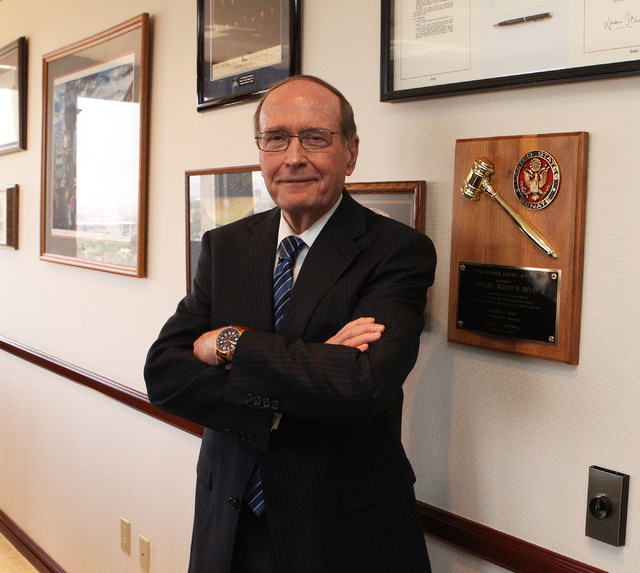





The face of the law industry in the Las Vegas Valley is unmistakable. Familiar local firms are disappearing. National firms are growing their Las Vegas footprint. Boutique firms are springing up as lawyers play a high-end game of musical chairs.
The causes – from the economic downturn of 2008, the rise of national firms in Las Vegas and recent technological advances – are as varied as the opinions on whether the consumer of legal consumers is the beneficiary, according to local legal experts.
Two high-profile cases shape the conversation: Lionel Sawyer & Collins filed for bankruptcy in February and June 20, the American Lawyer reported the Gordon Silver firm would be dissolving later this year, just months after a host of attorneys left the firm.
Name partner Gerald Gordon joined managing shareholder and bankruptcy partner Gregory Garman and shareholder Erika Pike Turner in staring their own firm, Garman Turner Gordon, according to published reports.
Jeff Silver, a gaming attorney and the other name partner at Gordon Silver, also left the firm in May to join Dickinson Wright, a national firm with a Las Vegas office. A number of Gordon Silver lawyers followed him.
At Lionel Sawyer & Collins, name partner Samuel Lionel and former U.S. Sen. Richard Bryan left that firm to join longtime rival Fennemore Craig in January.
However, Mark Dzarnoski, Gordon Silver’s managing shareholder, said the situation at the two firms couldn’t be more different.
“I was under the impression that all of the lawyers left Lionel Sawyer & Collins and the business stopped at the same time,” he said. “All I really know is what happened at Gordon Silver. Right now, we have legal services that we are providing with offices in Phoenix, Reno and Las Vegas. So, I would say, from my understanding of what happened at Lionel Sawyer & Collins, there is a substantial difference because we are still providing legal services.”
Dzarnoski could not be reached for comment on the report the firm would dissolve later this year.
Bankruptcies good for business
Silver pointed to the economy as one of the reasons for the mass defections from Gordon Silver. The firm, which had a large bankruptcy practice, may have been hurt when Caesars Entertainment Operating Co. decided to use global firm Kirkland & Ellis to represent it in its $10 billion bankruptcy proceeding.
Silver had been a shareholder with Gordon Silver since 2013 and had an of-counsel relationship with the firm. However, he said he was not privy to financial information and can only speculate as to the firm’s financial situation.
“Gordon Silver was largely a bankruptcy-related practice, which activities seem to be at a lower ebb right now,” Silver said. “When you are doing bankruptcies, you are depending on businesses having financial issues themselves. If the economy is doing better, there could be an argument that fewer businesses are going out of business.”
Dan Hamilton, dean of UNLV’s William S. Boyd School of Law, said the Caesars case and the $173 million settlement involving CityCenter’s Harmon Hotel show just how sensitive the local legal landscape is.
“On the local side, you have very prominent, distinguished firms that are reshaping, and that does show how sensitive the legal market is in Las Vegas to changes in the legal landscape,” Hamilton said. “If one big case settles, or if one big potential case goes out of town, the ripple effects are felt very quickly here. … The market for legal services is now so tight that one big case can impact a law firm or a series of law firms.
“I would say it is a function of how the market for legal services is changing, and it certainly tracks the larger economic trends. The market for legal services has changed dramatically in the last 5-10 years in Las Vegas and around the country.”
National firms moving in
Bryan joined Fennemore Craig when Lionel Sawyer & Collins closed its doors on Dec. 31. He said many former Lionel Sawyer & Collins attorneys we’re invited to join Fennemore Craig, others joined other firms and some started their own firms.
He added that Lionel Sawyer & Collins was not affected by the downturn in bankruptcies.
“There are a number of big regional and national firms that have come into the market, and they have had an impact on the local legal profession,” Bryan said. “And, there are just changes occurring out there. I’m not really surprised that the legal profession is going through these profound changes as other businesses are also dealing with a changing world.”
The number of attorneys leaving Gordon Silver grew as 13 more left the firm on June 8 to join Silver at Dickinson Wright. Seven of those attorneys are joining the firm’s Las Vegas office, while the other six are opening a new Dickinson Wright office in Reno.
One of those attorneys, Michael Feder, said a few of the reasons the group chose to join Dickinson Wright was to once again partner with Silver, and the opportunity to join a national firm that has a strong foothold in Nevada.
“People have asked us why not just do it on your own,” Feder said. “One of the reasons is the group did it together is for the notion to do what is in the best interest of our clients. We believe in every attorney at the firm, and if my clients have an issue that I’m not an expert in, I can refer them to one of the other attorneys in the firm. … A lot of us believe you need to be a full-service firm to fully service your clients.”
Greenberg Traurig is a global law firm that took Quirk & Tratos in 2005, a local law firm that had been in business since 1969. The Las Vegas office, which has almost 40 attorneys, handles cases involving corporate and securities, intellectual property, entertainment, Internet law, gaming, litigation and appellate, real estate construction matters.
Mark Clayton, an attorney formerly with Lionel Sawyer & Collins, joined Greenberg Traurig in August, ahead of Lionel Sawyer & Collins closing its doors, according to a report in the Las Vegas Review Journal.
“Greenberg Traurig has a continued commitment to a culture of excellence around the delivery of quality legal services to clients in key areas of practice by top-tier lawyers,” said Jim Mace, administrative shareholder Greenberg Traurig’s Las Vegas office. “To that end, the firm has in place a number of policies and programming that allow our highly skilled attorneys to thrive and grow their practices at the firm.
“Primarily, we make sure that they are in a comfortable, inclusive environment; that they have the right business tools at their disposal so that they are free to practice law; and that collaboration is rewarded, as a priority in the context of meeting client’s ever-changing and complex needs.”
Hamilton said the center of gravity in the local legal landscape is changing to where the national firms are slowly becoming the dominant players. The growth of the national firms is also giving law students a wider array of choices.
“The long-time model where prestigious local firms were the dominant players is slowly changing,” he said. “So, the big national firms that for so long were a relatively small part of the legal landscape are an increasingly large part. Now, that’s not to say the prestigious local firms are going away – only to say that the national firms are playing a more and more prominent role.”
Technological changes
Dominic Gentile left Gordon Silver to start a new firm — Gentile Cristalli & Miller — in March.
Gentile said he became involved in business litigation and personal injury cases, and he wanted to be involved in more of those cases. He also wanted to get away from what he called the department-store type firm, where the firm is trying to be all things to clients.
He also said that department-store approach is struggling because the technological advances of the past few years can help clients find a more cost-effective avenue to legal representation. He added that because of today’s technology, trying to be all things to clients is not an economic model that is workable.
“There was a time when it was more efficient to have all of your work in one spot if you were a consumer of legal services,” Gentile said. “You were basically paying one retainer and having institutional knowledge of your problem and getting a quick turnaround. … However, when you are dealing with specialization, particularly with various specialized firms with tech case management software, those firms can collaborate on a matter involving a single client.”
Hamilton said technology has changed the delivery of services.
“Legal services are undergoing the same changes that other industries are undergoing — like journalism, publishing and the music business — where technology and ever greater client sophistication are changing the way law firms operate. Clients are generally much more sophisticated and demanding, and they have greater leverage to negotiate the costs.”







